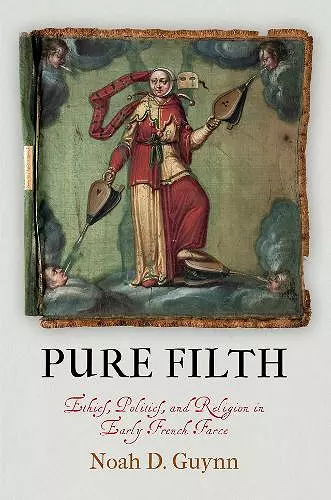Pure Filth
Ethics, Politics, and Religion in Early French Farce
Format:Hardback
Publisher:University of Pennsylvania Press
Published:8th Nov '19
Should be back in stock very soon

In Pure Filth, Noah D. Guynn argues that the superficial crudeness and predictability of late medieval French farce conceal finely drawn, and sometimes quite radical, perspectives on ethics, politics, and religion.
As Noah D. Guynn observes, early French farce has been summarily dismissed as filth for centuries. Renaissance humanists, classical moralists, and Enlightenment philosophes belittled it as an embarrassing reminder of the vulgarity of medieval popular culture. Modern literary critics and theater historians often view it as comedy's poor relation—trite, smutty pap that served to divert the masses and to inure them to lives of subservience. Yet, as Guynn demonstrates in his reexamination of the genre, the superficial crudeness and predictability of farce belie the complexities of its signifying and performance practices and the dynamic, contested nature of its field of reception. Pure Filth focuses on overlooked and occluded content in farce, arguing that apparently coarse jokes conceal finely drawn, and sometimes quite radical, perspectives on ethics, politics, and religion.
Engaging with cultural history, political anthropology, and critical, feminist, and queer theory, Guynn shows that farce does not pander to the rabble in order to cultivate acquiescence or curb dissent. Rather, it uses the tools of comic theater—parody and satire, imitation and exaggeration, cross-dressing and masquerade—to address the urgent issues its spectators faced in their everyday lives: economic inequality and authoritarian rule, social justice and ethical renewal, sacramental devotion and sacerdotal corruption, and heterosocial relations and household politics. Achieving its subtlest effects by employing the lewdest forms of humor, farce reveals that aspirations to purity, whether ethical, political, or religious, are inevitably mired in the very filth they repudiate.
"[T]his book succeeds in showing farce’s historical significance as an engaging ethical form. Noah Guynn makes a major, overdue contribution by giving this repertory its full due. The wit of his writing makes it a peculiarly refreshing tonic during this pandemic year." * Speculum *
"Pure Filth is a scholarly yet very readable reappraisal of what farce is as a genre, and of how it is considerably subtler than we often assume. Guynn is commendably fair-minded in his criticism of those he disagrees with. He is scrupulously attentive to avoiding possible pitfalls of decontextualised analysis, whilst acknowledging that the performance history of early farce is always liable to be sketchy. All this makes for an exemplary study in the genre of farce." * H-France *
"[T]here is no denying the merits of [Guynn's] project: it is thoughtful and thought-provoking, well grounded in relevant intertexts and critical theory, and groundbreaking in its success at reimagining the 'ludic, interactive, and unpredictable liveness of the festive stage.'" * Renaissance Quarterly *
"Pure Filth is an expansive study of early French farce with a great deal to offer anyone interested in the transition from medieval to early modern drama...Rather than downplaying the superficiality, obscenity, and kitsch that characterize farce, Noah Guynn shows how these qualities allow the genre as a whole to imagine 'the possibility of a more ethical and just future precisely by disrupting a conventional language of virtue and vice and by demonstrating the scandalous lack of justice in the present moment.' His argument...is all the more remarkable and worth reading because it troubles along the way any settled boundary between the Middle Ages and postmodernity, theology and theory, compliance and rebellion." * Romantic Review *
"[A] brilliant study . . . In Pure Filth, a book that will become a standard reference for people studying farce, Guynn has brought new life and energy to seemingly innocuous plays, showing his readers that the concerns addressed in farce are our concerns, that farceurs were engaged in a serious battle against repressive authority and hegemonic practices." * EuropeNow *
"Employing a sensitive multilayered methodology comprised of literary close reading, contemporary theory, examination of material conditions of theater production and performance, and historical contextualization, Pure Filth successfully extracts us from the subversive versus conservative impasse that plagues scholarship on humor." * Lisa Perfetti, Whitman College *
"This is a major study of a sizable body of texts that has tended to be marginalized in mainstream literary studies. Using an array of theoretical tools (poststructuralist, anthropological, feminist, and queer), Noah D. Guynn offers a sophisticated and subtle view of works more often perceived as having little literary merit and sometimes rather crudely read through a functionalist lens." * Simon Gaunt, King's College London *
- Commended for Received Honorable Mention for the David Bevington Award for best new book in early drama studies, granted by the Medieval and Renaissance Drama Society 2021
- Short-listed for Chosen as a finalist for the 2019 George Freedley Memorial Award, granted by the Theatre Library Association 2021
ISBN: 9780812251685
Dimensions: unknown
Weight: unknown
272 pages